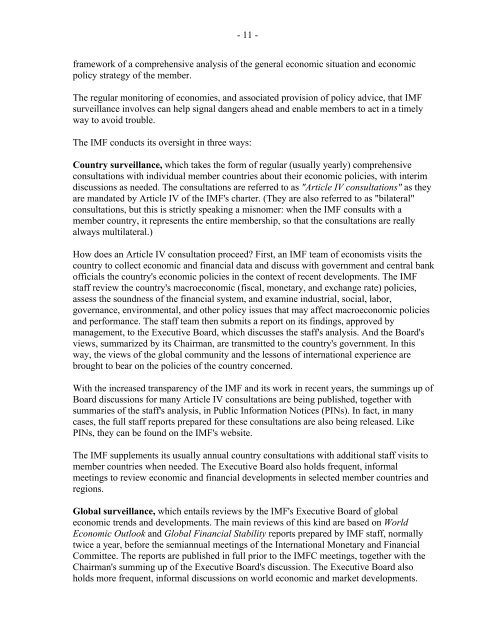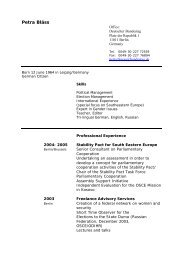What Is the International Monetary Fund? - the JVI eCampus!
What Is the International Monetary Fund? - the JVI eCampus!
What Is the International Monetary Fund? - the JVI eCampus!
You also want an ePaper? Increase the reach of your titles
YUMPU automatically turns print PDFs into web optimized ePapers that Google loves.
- 11 -<br />
framework of a comprehensive analysis of <strong>the</strong> general economic situation and economic<br />
policy strategy of <strong>the</strong> member.<br />
The regular monitoring of economies, and associated provision of policy advice, that IMF<br />
surveillance involves can help signal dangers ahead and enable members to act in a timely<br />
way to avoid trouble.<br />
The IMF conducts its oversight in three ways:<br />
Country surveillance, which takes <strong>the</strong> form of regular (usually yearly) comprehensive<br />
consultations with individual member countries about <strong>the</strong>ir economic policies, with interim<br />
discussions as needed. The consultations are referred to as "Article IV consultations" as <strong>the</strong>y<br />
are mandated by Article IV of <strong>the</strong> IMF's charter. (They are also referred to as "bilateral"<br />
consultations, but this is strictly speaking a misnomer: when <strong>the</strong> IMF consults with a<br />
member country, it represents <strong>the</strong> entire membership, so that <strong>the</strong> consultations are really<br />
always multilateral.)<br />
How does an Article IV consultation proceed? First, an IMF team of economists visits <strong>the</strong><br />
country to collect economic and financial data and discuss with government and central bank<br />
officials <strong>the</strong> country's economic policies in <strong>the</strong> context of recent developments. The IMF<br />
staff review <strong>the</strong> country's macroeconomic (fiscal, monetary, and exchange rate) policies,<br />
assess <strong>the</strong> soundness of <strong>the</strong> financial system, and examine industrial, social, labor,<br />
governance, environmental, and o<strong>the</strong>r policy issues that may affect macroeconomic policies<br />
and performance. The staff team <strong>the</strong>n submits a report on its findings, approved by<br />
management, to <strong>the</strong> Executive Board, which discusses <strong>the</strong> staff's analysis. And <strong>the</strong> Board's<br />
views, summarized by its Chairman, are transmitted to <strong>the</strong> country's government. In this<br />
way, <strong>the</strong> views of <strong>the</strong> global community and <strong>the</strong> lessons of international experience are<br />
brought to bear on <strong>the</strong> policies of <strong>the</strong> country concerned.<br />
With <strong>the</strong> increased transparency of <strong>the</strong> IMF and its work in recent years, <strong>the</strong> summings up of<br />
Board discussions for many Article IV consultations are being published, toge<strong>the</strong>r with<br />
summaries of <strong>the</strong> staff's analysis, in Public Information Notices (PINs). In fact, in many<br />
cases, <strong>the</strong> full staff reports prepared for <strong>the</strong>se consultations are also being released. Like<br />
PINs, <strong>the</strong>y can be found on <strong>the</strong> IMF's website.<br />
The IMF supplements its usually annual country consultations with additional staff visits to<br />
member countries when needed. The Executive Board also holds frequent, informal<br />
meetings to review economic and financial developments in selected member countries and<br />
regions.<br />
Global surveillance, which entails reviews by <strong>the</strong> IMF's Executive Board of global<br />
economic trends and developments. The main reviews of this kind are based on World<br />
Economic Outlook and Global Financial Stability reports prepared by IMF staff, normally<br />
twice a year, before <strong>the</strong> semiannual meetings of <strong>the</strong> <strong>International</strong> <strong>Monetary</strong> and Financial<br />
Committee. The reports are published in full prior to <strong>the</strong> IMFC meetings, toge<strong>the</strong>r with <strong>the</strong><br />
Chairman's summing up of <strong>the</strong> Executive Board's discussion. The Executive Board also<br />
holds more frequent, informal discussions on world economic and market developments.



